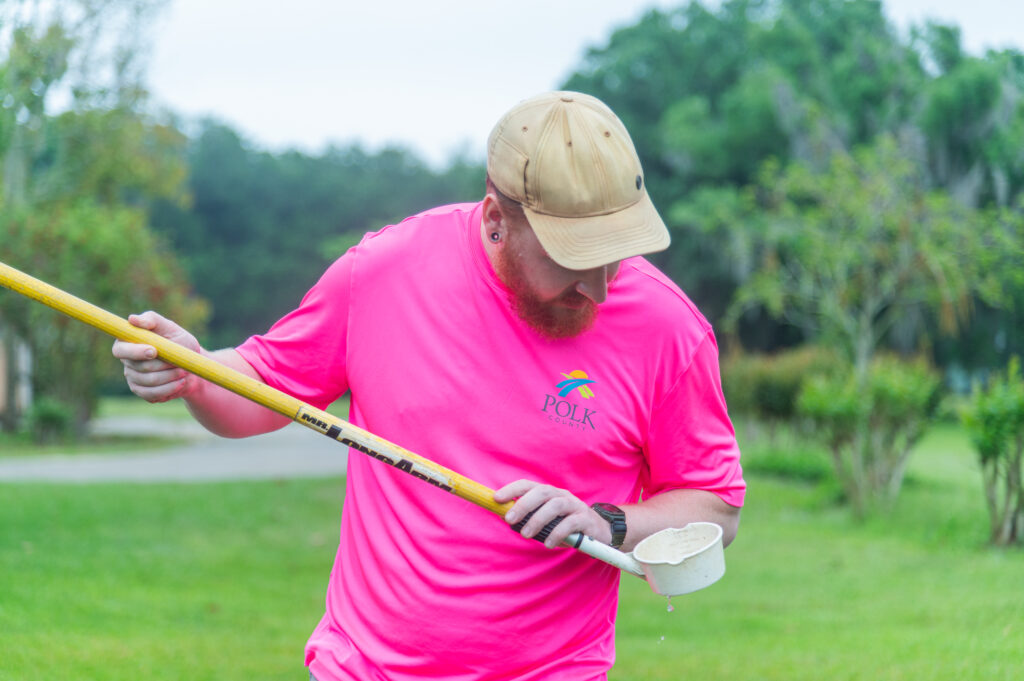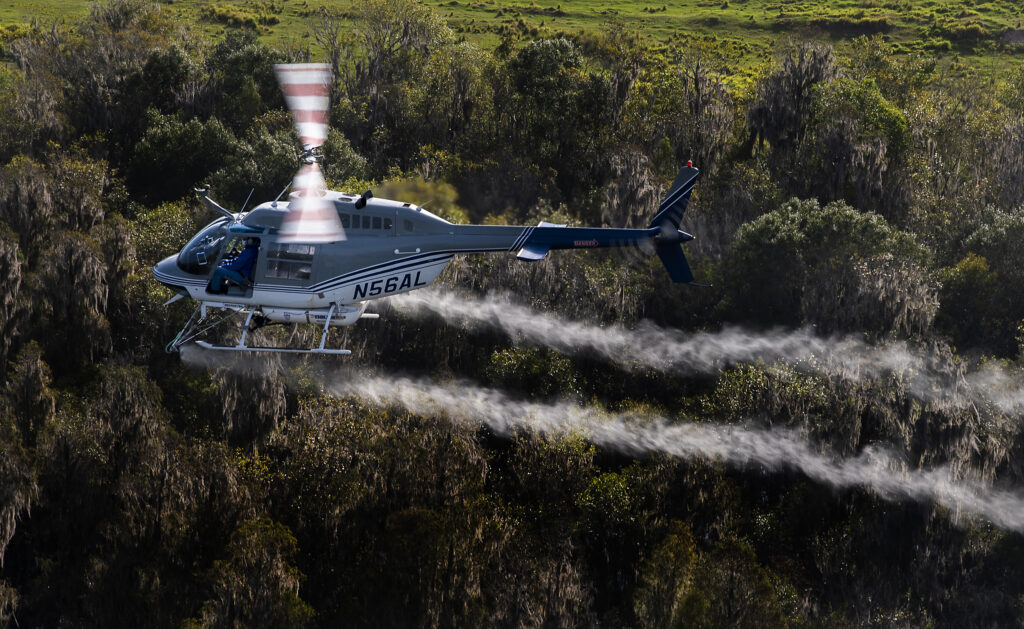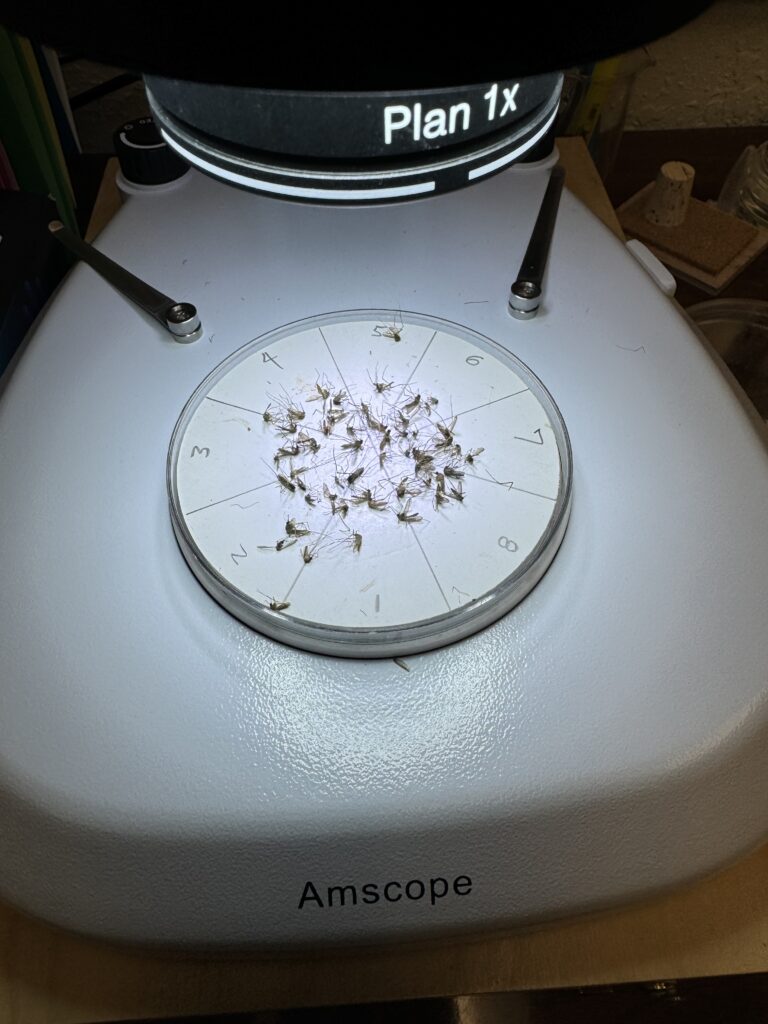Mosquitoes are near the top of the list of annoying things. They make it hard to enjoy outdoor activities, especially from dusk till dawn, when they’re the most active. And, as summer arrives, this is when we want to be outside. It’s a time for cookouts and hangouts.
Unfortunately, though, mosquitoes are more than annoying. They can be deadly.
Though they are small, mosquito bites pack a powerful punch. Have you ever heard of West Nile virus? How about malaria, Zika virus, Chikungunya virus or Dengue? Mosquitoes can carry them, and one bite from an infected mosquito can lead to debilitating disease and even death for a human or animal.
Fortunately, Polk County’s Mosquito Control Program has been protecting public health since 1958, monitoring and managing the county’s mosquito population. The program uses science to benefit Polk County’s residents, utilizing sophisticated techniques to stay on top of what’s happening with our mosquito population and to reduce public threats.
“We keep what happens in less developed countries, where thousands of people die each year due to mosquito-borne diseases, from occurring in Polk County,” said Jackson Mosley, Ph.D., manager of the Mosquito Control Program. “We are a strong line of defense.”
Thanks a Lot, Polk County Water!
There’s a lot of water in Polk County. Anybody who boats or fishes appreciates our 500 lakes and wetlands. Guess who else appreciates all the county’s water? Yep, the mosquitoes!
Even more than the lakes and wetlands, however, the mosquitoes like our ditches and ponds. In lakes, fish eat mosquito larvae. Predators are absent in smaller, temporary bodies of water, though, allowing the mosquito population to go unchecked.
The Methods for “Mosquito Control” are Larviciding and Adulticiding
 “In an ideal world, we would simply stop mosquitoes from breeding,” said Mosley. “But that’s not possible. First, mosquitoes play an important role in the food chain. Many predators eat them. Second, human development provides mosquitoes with perfect larval habitats. They can literally use anything that holds water to make a home.”
“In an ideal world, we would simply stop mosquitoes from breeding,” said Mosley. “But that’s not possible. First, mosquitoes play an important role in the food chain. Many predators eat them. Second, human development provides mosquitoes with perfect larval habitats. They can literally use anything that holds water to make a home.”
Since stopping mosquitoes from breeding is out of the question, Mosquito Control utilizes larviciding and adulticiding. OK, so what exactly do those two words mean?
Larviciding
Larviciding takes place when a Mosquito Control employee applies mosquito larvae-specific bacteria or growth regulator into a ditch or pond to control the immature stages of mosquitoes or to prevent larvae from becoming adult mosquitoes.
Adulticiding
Adulticiding is another form of treatment, and it is typically the last effort to control mosquitoes. Often performed by vehicle or helicopter, adulticide treatments can have minimal effects on other insects when properly applied. Adulticiding is done at night when adult mosquitoes are most active and when most non-target insects, like bees, dragonflies, and butterflies, are not as active.
It’s important to note that there’s an exact science to everything Mosquito Control does. For example, there is no larviciding or adulticiding schedule. Instead, these techniques are used only when research shows that they are needed and will be effective.
Additionally, Mosquito Control always uses techniques that present the least amount of harm to creatures other than mosquitoes. They take a strategic approach. For example:
- If they use a chemical spray, Mosquito Control rotates the chemicals used so mosquitoes do not build up a resistance.
- When Mosquito Control is planning to spray, they alert the beekeeping community so that honeybees, who play an important pollination role in society, can be protected.
How Else Are Mosquitoes Controlled?
“We use an integrated approach,” said Mosley, who oversees Mosquito Control’s 16 employees and seasonal workers. “We don’t reach for the chemical gun immediately. Instead, we do everything, from surveillance to treatments to resistance testing and public outreach.”
In 2023, Mosquito Control deployed more than 3,600 traps in Polk County, capturing hundreds of thousands of mosquitoes. The mosquito specific traps are placed near populated areas on a weekly basis, and these traps are baited with dried ice that emits carbon dioxide as it melts to mimic human breath. This attracts mosquitoes.
The trapped mosquitoes are taken to a lab and placed under a microscope. They are each counted and identified by species.
“The monitoring and identification process is so important,” Mosley said. “Determining what species are in the county alerts us to what potential diseases we need to be aware of. That will drive our treatment approach and help us react quickly to possible threats.”
Polk County also has a sentinel chicken program. There are eight county-owned chicken coups throughout Polk, each with multiple chickens that are tested each week for virus activity. This allows Mosquito Control to identify potential diseases being carried by mosquitoes.
For fellow animal lovers, know that the chickens have good lives. They are not harmed, they eat well and are well cared for, and they also get to enjoy retirement after working for a period of time.
Are Mosquitoes Truly Evil?
 Mosley said that, while he understands why most people despise mosquitoes, they are not evil creatures. Instead, they typically become hijacked by viruses when they bite an infected host during blood feeding.
Mosley said that, while he understands why most people despise mosquitoes, they are not evil creatures. Instead, they typically become hijacked by viruses when they bite an infected host during blood feeding.
“They get nothing from infecting us,” Mosley said. “That’s not their goal.”
And there’s even a so-called “good” mosquito, Mosley added. Its larvae preys on other mosquito larvae and the adults do not need blood, so they do not bite people or animals.
Nevertheless, most female mosquitoes do indeed bite people and, even if they’re not carrying disease, that’s reason enough to dislike them. So, what can you do to minimize the bites?
You Can Be Part of the Solution
In addition to applying a repellant such as DEET to your skin, Mosley says you can practice something he calls “source reduction.”
“Eliminate containers that hold water,” Mosley said. “Whether it’s a tire, a flowerpot, a toy or a birdbath, get rid of it, or drain and cover it. When they’re wet, these things are great places for mosquitoes to have their eggs in and produce more mosquitoes.”
Visit Polk County Mosquito Control for more information.